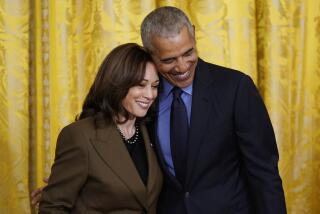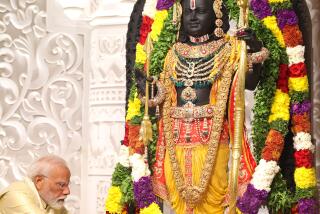A dynasty isn’t a democracy
As the U.S. election season shifts creakily into higher gear, our leaders are enthusiastically lionizing slain Pakistani politician Benazir Bhutto. The former prime minister “returned to Pakistan to fight for democracy,” noted Hillary Clinton. “The assassination of Benazir Bhutto is a tragic event ... for democracy,” mourned Rudy Giuliani. Meanwhile, President Bush urged Pakistanis “to honor Benazir Bhutto’s memory by continuing with the democratic process for which she so bravely gave her life.”
Hold on! Bhutto was a courageous and compelling figure, but hardly a martyr to democracy. The daughter of a prime minister, Bhutto took over the leadership of the Pakistan People’s Party from her mother, who herself inherited party leadership from Bhutto’s father. Bhutto’s own two terms as Pakistan’s prime minister were marred by corruption scandals and allegations of involvement in still darker activities, including the 1996 murder of her own brother, a party rival.
Her policies didn’t always further democracy either. Bhutto actively supported the Taliban’s military takeover of Afghanistan, for instance. She was willing to help empower the most extremist and repressive Islamic organization the world has so far seen in exchange for the imagined strategic advantage an entrenched Taliban government in Afghanistan would give Pakistan in its unending power struggle with India.
After disgrace and exile, Bhutto returned to Pakistan in the fall of 2007 on a self-styled mission to rescue Pakistan from chaos, and she loudly demanded the restoration of democracy. Pakistan could use some genuine democracy -- but Bhutto, an eternally polarizing figure, was hardly the woman to usher in a new era of democratic stability, regardless of the Bush administration’s hopes.
Bhutto’s tragic death itself underlines the limits of her commitment to democracy. In her will, she named her 19-year-old son, Bilawal Bhutto Zardari, as her successor as chair of the Pakistan People’s Party, appointing her husband, Asif Ali Zardari, as co-chair and quasi-regent until Bilawal comes of age. To Bhutto, political power was something one could inherit, something to be passed along from spouse to spouse and from parent to child, like grandmother’s pearls or grandfather’s favorite chair -- or like the infamous Swiss bank accounts that led to corruption charges against her in several countries.
And who knows? Maybe Bilawal’s not such a bad choice for the Pakistan People’s Party. A history student at Oxford, he already has a constituency -- at least on Facebook, where someone has established a new fan group called “Let’s not assassinate Bilawal Bhutto because he’s hot, OK?” Bilawal’s own Facebook profile is fairly modest: “I am not a politician or a great thinker. I’m merely a student. I do the things that students do like make mistakes, eat junk food ... but most importantly of all ... learn.” Still, “My time to lead will come.”
What’s weirdest about all this is that not very many people here in the U.S. seem to have noticed that this is all pretty weird. A champion of democracy passes along political leadership in her will, leaving it to her husband and son? That’s dynastic politics, not democratic politics.
Kings and queens pass along their political positions to their children. Paragons of democracy do not. But you won’t find even a hint of this in the reactions of the leading presidential contenders from either party, or from the White House, or from most leading U.S. media commentators.
There is, of course, an obvious and depressing explanation for why so few people in the U.S. seem to have registered this as jarring: We’re perilously close to becoming a dynastic state ourselves. Our current president, George W. Bush, is the son of our former president, George H.W. Bush. Sen. Hillary Rodham Clinton, who is struggling today to hold on to her position as Democratic Party front-runner, is married to former President Clinton.
You can’t blame the heirs of political dynasties for their fortunes. Nineteen-year-old Bilawal is a pawn in a deadly game; so far, he hasn’t had much control over his life. Benazir Bhutto didn’t have much either: In September, she wrote, rather poignantly, “I didn’t choose this life. It chose me.” Similarly, George W. Bush didn’t choose his father, and it’s not Hillary Clinton’s fault that the young law professor she married later became president.
All the same, there’s something awfully creepy about the dynastic trend in American politics. If Hillary Clinton is elected president in 2008, by 2012 the U.S. presidency will have been controlled for 24 years by only two families. More families have divvied up the political spoils in Pakistan in the last 24 years.
The U.S. isn’t Pakistan, thank goodness. But as voters in Iowa’s caucuses kick off the 2008 presidential season, we’d do well to think about what makes the U.S. and Pakistan different -- and about what values we Americans need to nurture if we’re going to remain a true democracy and not sink into our own brand of corrupt dynastic politics.
--
More to Read
Sign up for Essential California
The most important California stories and recommendations in your inbox every morning.
You may occasionally receive promotional content from the Los Angeles Times.










